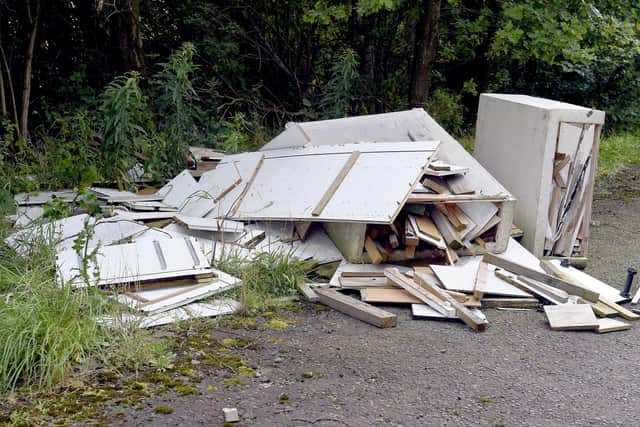Farming: Can England help us turn back the fly-tipping tide? - Brian Henderson
I’ve no idea how many responses they got but I wouldn’t be surprised if it was quite a considerable number, judging not only by the amount of rubbish you see dumped around this beautiful country but also by the number of press releases on the issue which have crossed my desk over the past few years.
Barely a month goes by without one organisation or another expressing righteous indignation at this callous offence which, as all the press releases say, is a real blight on the countryside.
Advertisement
Hide AdAdvertisement
Hide AdAnd sadly it’s one which can land any poor farmer or landowner with a huge bill to pay for any clean-up operation required – for not all councils are understanding enough to help out, even when it’s been a lorry load of asbestos sheeting or a van-full of meat processing waste which are not only potentially dangerous but which also require specialist waste disposal companies to handle them – at considerable cost.


I’ve also no idea what was included in some of these responses, but I might guess that some of it wouldn’t be fit for publishing in this, or any, polite newspaper.
A lot of the consultation seemed to revolve around driving behavioural change – which sounds good but I have a suspicion that a lot of the worst cases of fly-tipping are carried out by cold-hearted commercial operators who will probably be paid to take the stuff away from people’s houses or from small businesses and then avoid any costs at the other end by simply dumping it in a field gate or by the roadside.
Waste criminals profit at the expense of legitimate businesses, undercutting them by not paying to dispose of waste at approved sites and competing unfairly. This can often lead to large scale fly-tipping, particularly in rural locations.
One thought did strike me and that is to change the terminology – for I can’t help but feel that “fly-tipping” falls well short of a fair description of the offence, carrying with it a bit of a “nudge-nudge, wink-wink, say no more guv” sort of dodgy dealer image, like Dell-Boy intent on committing a bit of petty and victimless rule-bending.
There are always calls for fines to be increased to act as greater deterrent to such activities – but at the moment if a person is found guilty of the offence they can be issued with a fixed-penalty notice of a few hundred quid, or could potentially be sentenced to imprisonment and risk a fine of up to £40,000.
So, if used to its full extent, there is quite a hefty disincentive there already. But what is interesting is the fact that while the crime seemed to increase massively over the Covid lockdown period when the municipal waste centres were closed (and many people were spending their enforced time at home catching up on the DIY jobs they’d been promising to get done since they moved, producing much of the waste dumped) the number of prosecutions collapsed.
The official figures show that while back in 2014/15 there were 18 prosecutions, 13 of which were successful, come the pandemic year of 2019/20 there were only two.
Advertisement
Hide AdAdvertisement
Hide AdFair enough, the hard-pressed police force is busy with other things, many of which they might feel are more immediately important, especially when it’s difficult to reach the required level of proof to enforce a conviction when the crime is often committed in remote areas and under cover of darkness.
But perhaps the legislators should take a look south of the Border.
For England, too, is having a crackdown on fly-tipping, with new proposals for a crackdown being published this very day.
And one major initiative which might actually make a considerable difference would drive behavioural change in the most basic way possible – by appealing to the general public’s pockets.
Under the new plans, removing the right of local authorities to charge for the collection of DIY waste like plasterboard, bricks and old baths – which accounts for around two-thirds of all dumping incidents – will mean that households will no longer need to pay to get rid of the waste which their home improvement projects create.
True, this might incur some extra costs – but if it reduce the £46 million it costs councils to clear up fly-tipped rubbish, to say nothing of the costs to landowners, it could be money well spent.
A message from the Editor:
Thank you for reading this article. We're more reliant on your support than ever as the shift in consumer habits brought about by coronavirus impacts our advertisers.
If you haven't already, please consider supporting our trusted, fact-checked journalism by taking out a digital subscription.
Comments
Want to join the conversation? Please or to comment on this article.
